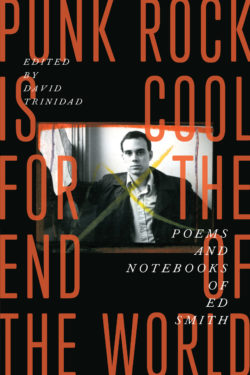Punk Rock Is Cool for the End of the World
David Trinidad Ed SmithThe irreverent, tweetable, ludicrous, painful, wondrous work of the L.A. punk poet—widely available for the first time.
In Punk Rock Is Cool for the End of the World, David Trinidad brings together a comprehensive selection of Ed Smith’s work: his published books; unpublished poems; excerpts from his extensive notebooks; photos and ephemera; and his timely “cry for civilization,” “Return to Lesbos”: put down that gun / stop electing Presidents.
Ed Smith blazed onto the Los Angeles poetry scene in the early 1980s from out of the hardcore punk scene. The charismatic, nerdy young man hit home with his funny/scary off-the-cuff-sounding poems, like “Fishing”: This is a good line. / This is a bad line. This is a fishing line.
Ed’s vibrant “gang” of writer and artist friends—among them Amy Gerstler, Dennis Cooper, Bob Flanagan, Mike Kelley, and David Trinidad—congregated at Beyond Baroque in Venice, on LA’s west side. They read and partied and performed together, and shared and published each others’ work.
Ed was more than bright and versatile: he worked as a math tutor, an animator, and a typesetter. In the mid-1990s, he fell in love with Japanese artist Mio Shirai; they married and moved to New York City. Despite productive years and joyful times, Ed was plagued by mood disorders and drug problems, and at the age of forty-eight, he took his own life.
Ed Smith’s poems speak to living in an increasingly dehumanizing consumer society and corrupt political system. This “punk Dorothy Parker” is more relevant than ever for our ADD, technology-distracted times.
- "Sappho invented civilization, and Ed Smith made it punk."—Tony Trigilio
- "Reflecting the heroic editorial efforts of David Trinidad, this collection of Ed Smith's poems and journals makes me nostalgic for a lost era; sad that this talented if troubled poet took his own life; glad that we included his work in The Best American Erotic Poems, and in total agreement with David Trinidad that Smith's poetry would have a salutary effect on a group of young writers, such as those attending a graduate writing program."—David Lehman

